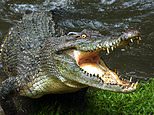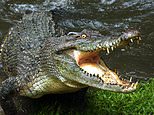Ever been mauled by a crocodile? Intriguing NHS data shows thousands of people were hospitalized last year due to animal attacks… and it’s NOT just dog bites



Nearly 30,000 Brits were sent to NHS hospitals last year due to animal attacks, with crocodiles, fish and scorpions just some of the culprits, MailOnline can reveal.
Of these, more than 10,000 were classified as emergency admissions, meaning the victims required urgent care to save their lives or limbs.
NHS data shows that dogs were the most dangerous animal in England in the 2023-2024 financial year, with almost 11,000 bites and strikes, the latter of which occurred when a dog knocked someone over.
Of these, nearly 4,000 were emergencies requiring urgent medical care.
But far more exotic and even mundane animal attackers were also responsible for sending Brits to hospital, with crocodiles, fish and even centipedes just some of the NHS data.
After man’s best friend, bites and stings from non-venomous insects were the biggest cause of Britons needing animal-related hospital care.
This group of creepy crawlies, which also includes animals such as spiders, ticks and beetles, sent more than 6,000 people to the hospital last year, half of them emergencies.
Although the NHS data does not detail the exact medical reason why people needed care in these circumstances, allergic reactions can be a major cause of needing hospital care for what is normally a minor condition.
In third place for attacks on animals was a broad group called ‘other mammals’ in NHS data.
Nearly 5,000 Britons required hospital care for this group of creatures, which included farm favorites such as cows and horses, as well as some domestic animals such as ferrets and cats.
Of these cases, only about one in four was classified as an emergency.
The more common critters in British life were responsible for the majority of animal-related injuries, but a few Brits were unlucky enough to need care for an unusual animal attack.
Seven Britons were diagnosed with medical problems after being bitten or hit by a crocodile or alligator, with one of these incidents being a medical emergency.
None of the crocodiles are native to the British Isles, meaning these incidents are likely linked to people working with the reptiles or visiting them as part of zoos or wildlife experiences.
Other attacks on rare animals included incidents involving scorpions and tropical venomous centipedes and millipedes, with four and one cases of Britons seeking medical attention respectively last year. These incidents likely involved zoos or exotic pet owners.
Even the water wasn’t safe: almost 100 Britons were sent to hospital after bites or strikes with marine animals such as fish and/or stings from aquatic inhabitants such as jellyfish.
On a case-by-case basis, marine animals such as fish, sharks and dolphins were found to be among the most dangerous in Britain, with more than half classified as emergencies.
This was closely followed by bee stings, a major hazard for allergy sufferers.
Other strange reasons why Brits needed NHS care last year included 91 cases of eating poisonous mushrooms, 14 lightning strikes and four incidents of people needing help after a volcanic eruption.
The NHS data is anonymised and only reveals the age and gender of patients, a general description of the location of incidents and whether the case was an emergency.
It also only records admissions, not individual patients, so in theory an individual Briton could appear more than once in the figures.




